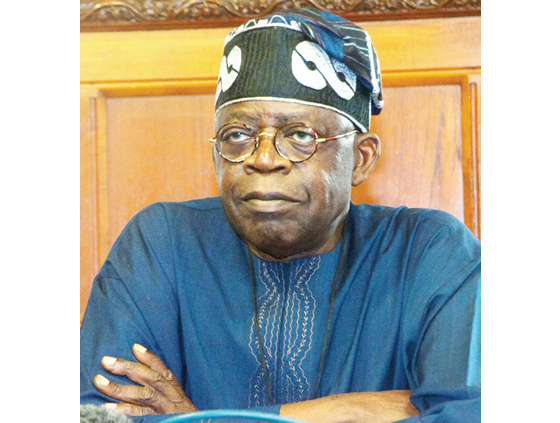By Emeka Alex Duru
The directive, ordinarily, would appear to have emanated from a wrong channel – a mere intra-party affair that should have been handled by the information and publicity section of the All Progressives Congress (APC). But the announcement was made by the Senior Special Assistant to the President on Media and Publicity, Garba Shehu.
A barely two-paragraph piece; but it indicated the level of crisis in the party and the need to patch up things before they slip out of control in the run-up to the 2019 general elections.
It read: “As part of on-going efforts to improve cohesion within the All Progressives Congress (APC), President Muhammadu Buhari has designated Asiwaju Bola Ahmed Tinubu to lead the consultation, reconciliation and confidence building efforts.
“The assignment will involve resolving disagreements among party members, party leadership and political office holders in some states of the Federation.”
That practically laid bare the enormity of disharmony in the ruling party. And in what seems the seriousness of the agenda, the former Lagos governor, on whose shoulders the daunting task of reconciling the party lies, went into action, immediately.
In some of the states Tinubu had visited, he had raised hopes of attaining success in the mission. Going by photo opportunities he had shared with the major protagonists in some of the states, there has been the temptation to assume that he may deliver on his mission, perhaps, sooner than the President may have expected.
But that may be as much as the enthusiasm goes. Among chieftains and supporters of the party, the task before Tinubu, is quite daunting. In some quarters for instance, he is seen as part of the problem, while in others, he is counted among the victims of APC use-and-dump politics.
For his foot soldiers therefore, the former Lagos governor even needs to be reconciled with APC before he embarks on the project. His wife, Oluremi, a Senator, gave hint of how he had been dumped by the Presidency after helping the party to power in 2015.
“He was campaigning, I did too. We were running three campaigns in my house. And for him to be trashed like that?”, she revealed when she featured on a breakfast show ofTelevision Continental, a Lagos Television Station.
Before the outing by Mrs. Tinubu, there had been insinuations that the former governor, had literally been reduced to the status of an ordinary member in the party.
Events that led to the eventual emergence of Governor Yahya Bello of Kogi State and Governor Rotimi Akeredolu of Ondo State, ranked among the instances on the alleged agenda to cut Tinubu to size in the party.
While the APC national leader had preferred James Faleke, House of Representatives member and running mate to late Abubakar Audu, to stand as the APC candidate in the supplementary governorship election in Kogi following Audu’s death, the party leadership, settled for Bello.
On the Ondo incident, the allegation was that the delegates’ list for the state APC primary was doctored to favour Akeredolu by some persons in the party simply to stop Tinubu’s preferred choice, Segun Abrahams.
In both instances, Tinubu lost out while the President carried on as if nothing had happened. Our reporter gathered on good authority that his loyalists are yet to forgive Buhari and the APC for the demeaning actions.
States in crisis
But even if Tinubu, had let go as it is being advertised, there are still very serious issues in some states. In states like Sokoto, Bayelsa, Imo, Kogi and Kaduna, there have been incidences of personality clash and suspicion among the leaders.
While Tinubu gave impression of having reconciled Sokoto governor, Aminu Tambuwal and his predecessor, Aliyu Wamakko, the same cannot be said of the gladiators in Kogi and Kaduna. In these instances, the party has parallel officials.
The impasse in Kaduna even went to the extent of a rival faction, that has the sympathy of Senators Shehu Sani (Kaduna Central) and Suleiman Hunkuyi (Kaduna North), suspending the governor, Nasir el-Rufai for anti-party activities.
In retaliation, the governor allegedly sent out bulldozers and got the office of the rival faction demolished.
The situation in Imo is still smoldering but may fully blow open as the race for 2019 gathers team. At the heart of the disquiet is the party’s candidate for the governorship election. The governor, Rochas Okorocha, has not hidden his desire to see his son-in-law and chief of staff, Uche Nwosu, succeed him. Both are from Orlu (Imo West) Senatorial zone that has had Okorocha and Achike Udenwa as governors.
The development is not going down well with supporters of the deputy governor, Eze Madumere and his Owerri (Imo East) zone, nor party members from Okigwe (Imo North) Zone.
In what appeared a foretaste of what lies ahead, supporters of the deputy governor and chief of staff, took on one another on Sunday, February 18, in a melee that saw four people reportedly wounded.
In reaction to the situation in the state wing of the party, a senior official who did not want to be mentioned simply told our correspondent, “There is no APC in Imo”. Elsewhere, the situation remains dicey.
Enter the National Assembly
This, is perhaps, where Tinubu’s reconciliation efforts would be tasked greatly. In a way, he is being fingered in the crisis among the APC NASS members.
The distrust began to take shape shortly after the inauguration of the eighth NASS on June 9, 2015.
Before the inauguration, APC leadership in league with Tinubu, had in a manner that was not elaborately explained to even some key members, advertised Senators Ahmed Lawan/George Akume leadership for the Senate as well as Femi Gbajabiamila/Ali Monguno for the House of Representatives.
The decision however did not go down well with Bukola Saraki and his group in the Senate as well as Yakubu Dogara and his supporters in the House of Representatives.
The aggrieved elements who clearly had been schemed out of APC consideration, went into alliance with their PDP colleagues, thus giving rise to Saraki/Ike Ekeremadu victory in the Senate and Dogara’s emergence in the House.
APC did not take kindly to the matter. Raising the banner of threats and protest, the party vowed to get even with the Saraki, stressing that it would not accord his leadership of the NASS any form of recognition.
Though the President had before the NASS inauguration pledged not to interfere with the activities of the lawmakers but to work with any leadership selected by them, his subsequent actions indicated that he was on the same page with APC in not according Saraki the deserved recognition.
The frosty relationship between the NASS leadership on one hand and APC, the Presidency on the other hand, has remained so, nearly three years after.
Reconciling these various tendencies in the party and achieving a harmonious entity, is the task facing the former Lagos governor.
Senator Sani, may have adequately captured the mood of the moment in stressing that “Asiwaju’s APC reconciliation committee is the last penalty kick for peace and unity within the party.”
According to him, the committee is the last opportunity for peace in the ruling APC. Many rightly think so, in the face of dwindling popularity rating of the President, poor performance profile of the government and spiraling incidences of insecurity arising from Fulani Herdsmen menace.













